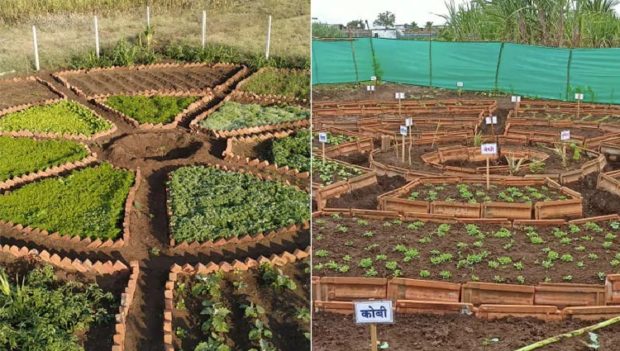
Nutri-gardens can help build immunity, reduce exposure to COVID-19: Experts
PTI, Sep 27, 2020, 12:45 PM IST

New Delhi: The concept of developing nutri-gardens at anganwadis will not only help in fighting malnutrition but can also play a crucial role in protecting children and pregnant women from coronavirus infection by reducing their exposure and building immunity, experts have said.
The Women and Child Development Ministry has urged States and Union territories to focus on the nutri-garden initiative for anganwadis.
To tackle malnutrition, the government is identifying locally available nutritious food in different parts of the country that can be grown at Anganwadi centres. These gardens are called nutri-gardens.
Experts said that apart from fighting malnutrition these nutri-gardens can also play a role in protecting children and pregnant women from coronavirus infection.
Somya, program manager for health, sanitation and nutrition from Rural Livelihoods Promotion Society popularly known as JEEViKA in Bihar, said in the era of COVID-19, having a nutri-garden at the household level can be very beneficial.
“It restricts movement to crowded places like vegetable markets and also helps save money during the period of economic hardship and organic fruits and vegetables help in improving immunity,” she said.
Ajay Srivastava, program manager – health and nutrition – Jharkhand State Livelihood Promotion, said there is a growing awareness of improving immunity to reduce the risk of contracting diseases like coronavirus.
“It is being emphasised that immunity can be built by the consumption of vegetables and fruits rich in B-carotene and ascorbic acid. Growing of foods and vegetables prescribed for immunity booster. It is cost-effective and accessible for the rural community of Jharkhand,” Srivastava said.
Jharkhand State Livelihood Promotion and Bihar Jeevika are autonomous bodies under the rural development department of the respective state governments.
Sheila Vir, founder-director of the Public Health Nutrition and Development Centre in New Delhi, said theoretically, it would improve access and consumption.
“Growing of specific vegetables such as spinach, cholai etc in pots etc would help in improving daily consumption. These minerals and vitamins have immunological property but the diet needs to be wholesome – tiranga colour – cereal (rice/roti), dal and vegetables,” she noted.
The experts said nutri-gardens can help improve access to vegetables and its regular consumption would help in meeting the gap of vitamins and minerals which is often referred to as ‘hidden hunger.’
Vir said but along with growing vegetables in nutri-gardens, there is need to inform the community of various other aspects that leaves of cauliflower are rich in nutrients and should not be discarded but consumed as saag, retention of nutrients by appropriate method during cooking is important, appropriate solar drying technique like drying in shade to retain nutrients for off-season consumption etc are crucial.
“Moreover, there is a need to ensure that such gardens are first established in those houses which have a pregnant woman, a child 0-24 months and a newly married woman who will soon enter the stage of conception. Instead of universal coverage of all households in a village, special priority could be given to these “high risk” nutrition households,” she said.
Srivastava said the principal cause of undernutrition in rural communities is lack of accessibility to food with dietary diversification where poverty and other socio-economic factors are decisive for accessibility to food.
“Therefore, to sustain nutrition intake, nutri-garden ensures accessibility and availability of diversified food in the existing traditional agriculture practices. It is a cost-effective model as well with locally available seeds of fruits, vegetables and local manure is promoted and has a high penetration in terms of daily nutrition intake through daily minimal dietary habits of family members,” he said.
Somya said seasonal fruits and vegetables in the diet of all household members, helps address hidden-hunger (lack of a variety of micronutrients like vitamins and minerals in the diet) by improving dietary diversity.
Special emphasis was given to nutri-gardens by the government this month when the Poshan month was observed in the country.
During Poshan maah several programmes to spread awareness on the issues related to malnutrition in children, pregnant women and lactating mothers are being organised.
The Poshan maah is celebrated under the National Nutrition Mission or Poshan Abhiyan launched to tackle malnutrition among children and pregnant women in the country.
According to the National Family Health Survey-4 (NFHS-4), 38.4 per cent children under five years of age are stunted or low height-for-age and 21 per cent wasted or low weight-for-height in India.
As many as 48.3 per cent of children in Bihar under five are stunted, the survey said.
Udayavani is now on Telegram. Click here to join our channel and stay updated with the latest news.
Top News

Related Articles More

Sandeep Dikshit targets Kejriwal, calls him ‘pathological liar’

Charred body found in unfinished College hall in Kerala

Poor, deprived suffering brunt of ‘Manuvaad’ under BJP: Kharge

Student sexual assault: BJP to take out ‘justice rally’ from Madurai to Chennai, says Annamalai

Kerala CM condemns Maharashtra Minister’s ‘mini Pakistan’ remark
MUST WATCH
Latest Additions

Sandeep Dikshit targets Kejriwal, calls him ‘pathological liar’

Burqa-clad man detained during Ellamavasya Fair in Thirthahalli

Charred body found in unfinished College hall in Kerala

Poor, deprived suffering brunt of ‘Manuvaad’ under BJP: Kharge

Contractor’s suicide: BJP targets Priyank Kahrge without evidence, says home minister
Thanks for visiting Udayavani
You seem to have an Ad Blocker on.
To continue reading, please turn it off or whitelist Udayavani.



















